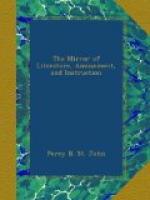But ah! the stars shone adverse at my
birth,
Tho’ boyish pleasures all my youth
beguil’d,
And little thought amidst those scenes
of mirth,
That I was doom’d to be misfortune’s
child.
At last the haggard wretch is come; and
I,
Like some poor hark, toss’d by the
mighty wave,
Am solitary left, nor have wherewith to
fly
Her dread embrace, save to man’s
friend—the grave.
No hope, alas! possesses now my mind,
Plung’d in the deepest gulf of penury;
No earthly friend, to pity none inclined;
To soothe the bitter pang of misery.
’Tis hope that raises us to heaven,
While pure affection breathes no other
love,
And makes to those to whom it’s
given
A something like a paradise above.
Alas! for me no earthly paradise awaits;
No true affection nor no friendly tear;
Spurn’d at by friends, and
scorned at by the great;
And all that poverty can bring is here.
Then hail thou grateful visitant, oh death,
And stop the troubled ocean of my breast:
Lull the rude waves; nor let my parting
breath
E’er cause a sigh, or break one
moment’s rest.
Then when my clay-cold form shall bid
adieu,
Hid in its parent’s bosom, kindred
earth,
Let not the errors e’er appear in
view,
But turn from them, and only speak his
worth.
J.A.
* * * * *
THE SKETCH BOOK.
No. XLVI.
* * * * *
THE CONVERSATION OF ACTORS.
Actors are rather generally esteemed to be what is commonly called “good company.” For our part, we think the companionable qualities of the members of the corps dramatique are much overrated. There are many of them, we know full well, as pleasant and agreeable spirits as any extant; but the great mass of actors are too outrageously professional to please. Their conversation is too much tainted with theatricals—they do not travel off the stage in their discourse—their gossip smacks of the green-room—their jests and good things are, for the most part, extracts from plays—they lack originality—the drama is their world, and they think nothing worthy of argument but men and matters connected with it. They are the weakest of all critics, their observations on characters in plays are hereditary opinions of the corps, which descend as heir looms with the part to its successive representatives. There are, doubtless, some splendid exceptions—we could name several performers, who talk finely on general subjects, who are not confined to the foot-lights in their fancies, who utter jests of the first water, whose sayings are worth hearing, and whose anecdotes are made up of such good materials, and are so well told withal, that our “lungs have crowed like chanticleer”




